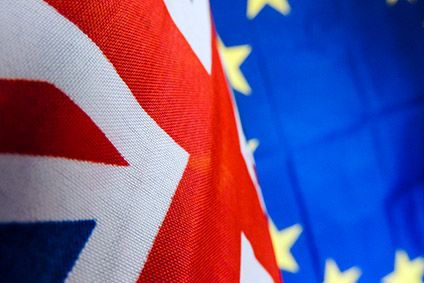
EU farming and food-manufacturing representatives have given their support to the new Brexit agreement struck between the bloc’s representatives and the UK.
Farming union Copa and Cogeca, CELCAA – which represents traders of agricultural commodities – and FoodDrinkEurope, the food-manufacturing organisation, said the deal – which faces opposition from parts of the UK legislature – “paves the way for an orderly withdrawal … thereby providing predictability to operators”.

Discover B2B Marketing That Performs
Combine business intelligence and editorial excellence to reach engaged professionals across 36 leading media platforms.
In a joint statement, they said: “In particular, the EU agri-food chain endorses the revised political declaration which confirms the ambition to conclude a Free Trade Agreement (FTA) with zero tariffs and quantitative restrictions between the EU and the UK. Despite the welcomed commitment to maintaining customs and regulatory convergence in future, we will not be able to replicate the advantages of the EU customs union and Single Market through an FTA. However, we hope to find a solution that is as close as possible to the current customs and regulatory agreement.”
The agreement, announced earlier today (17 October), will see the UK leave the EU customs union. The legal customs border would be between Northern Ireland and the Republic of Ireland. However, in practice, the border would be between the mainland of Great Britain and the island of Ireland. Goods would be checked at “points of entry” in Northern Ireland.
The UK would not levy tariffs on goods that remained in Northern Ireland but would if they items moved on out of the country. Every four years, the Northern Ireland Assembly – which has been suspended for more than two years – would vote on whether the arrangements should remain in place.
The agreement also stipulated the EU’s value-added tax (VAT) will apply in Northern Ireland but only on goods. That could mean Northern Ireland has different VAT rates to the rest of the UK.

US Tariffs are shifting - will you react or anticipate?
Don’t let policy changes catch you off guard. Stay proactive with real-time data and expert analysis.
By GlobalDataIn the previous withdrawal agreement negotiated by former UK Prime Minister Theresa May, which the country’s House of Commons voted down three times, there was an article on “non-regression of labour and social standards”.
In the new agreement, this section was removed but was covered in the accompanying political declaration, which is not legally binding.
The declaration does say: “The parties should uphold the common high standards applicable in the [European] Union and the United Kingdom at the end of the transition period in the areas of state aid, competition, social and employment standards, environment, climate change and relevant tax matters.”
Looking ahead, the UK and the EU said they would aim for a zero-tariff trade deal between the two markets with unlimited quotas.
However, Northern Ireland’s Democratic Unionist Party has said it would not support the deal and Labour’s Shadow Brexit Secretary Sir Keir Starmer has argued the agreement is “far worse” than the May deal.
Boris Johnson, the UK’s current Prime Minister, today described the agreement as “a great new deal”.
If the UK Parliament rejects the deal, by law Johnson must ask the EU for an extension of the country’s membership of the bloc to try to find new terms of agreement.
Members of the UK government have said it would obey the law but Johnson has said he would not ask for an extension.





